Module 3 Making plans Unit 1 What are you going to do at the weekends? 课件
文档属性
| 名称 | Module 3 Making plans Unit 1 What are you going to do at the weekends? 课件 | 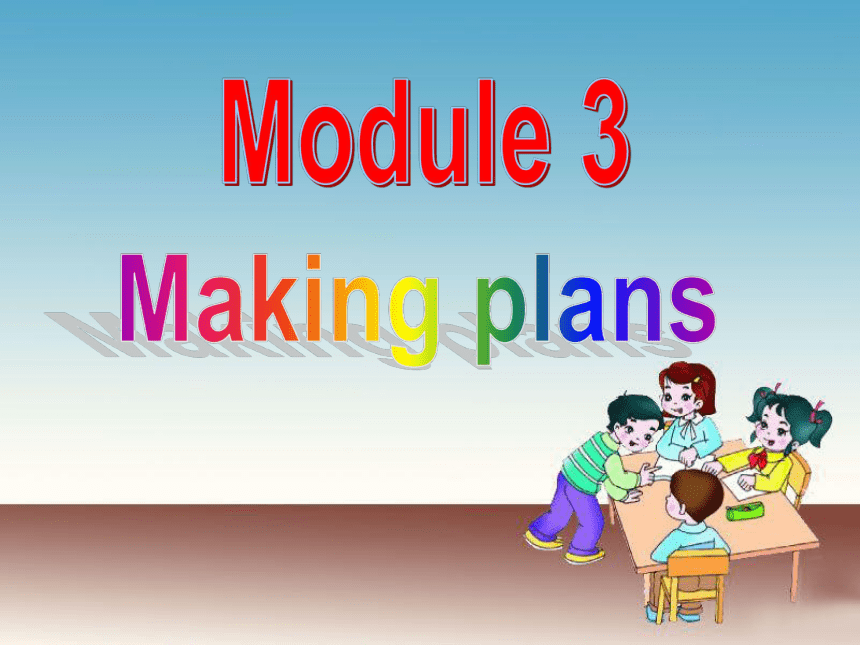 | |
| 格式 | zip | ||
| 文件大小 | 5.3MB | ||
| 资源类型 | 教案 | ||
| 版本资源 | 外研版 | ||
| 科目 | 英语 | ||
| 更新时间 | 2014-11-01 18:18:53 | ||
图片预览

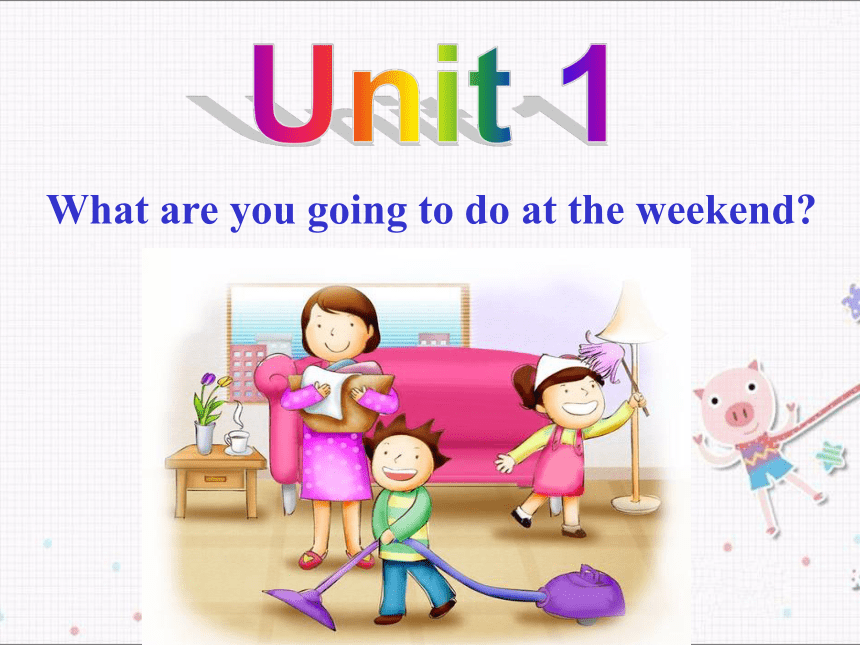


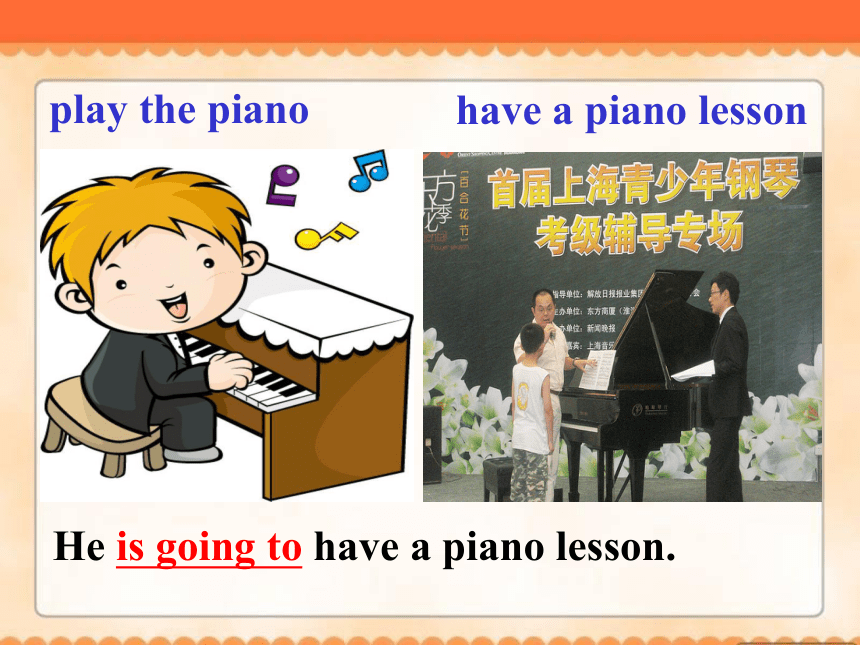



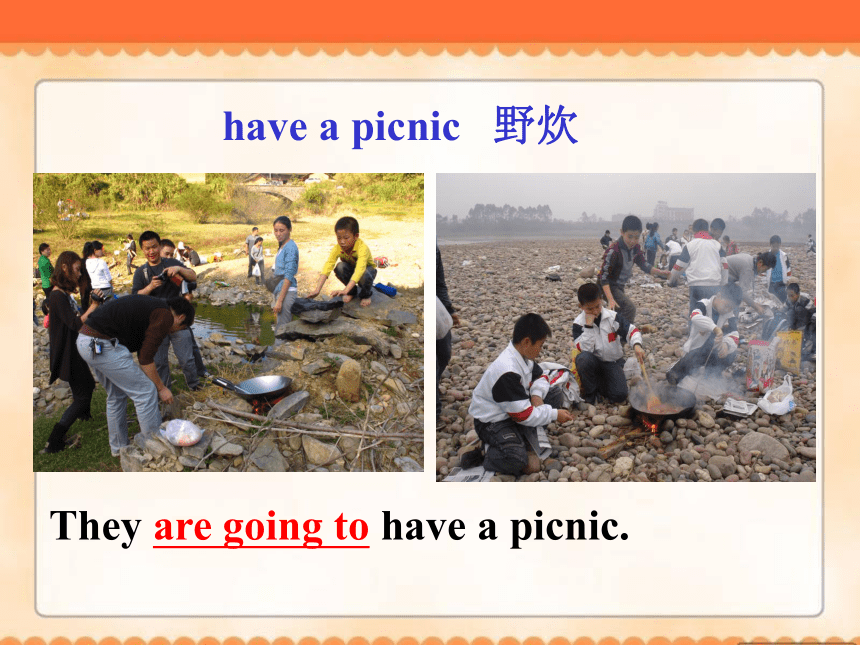
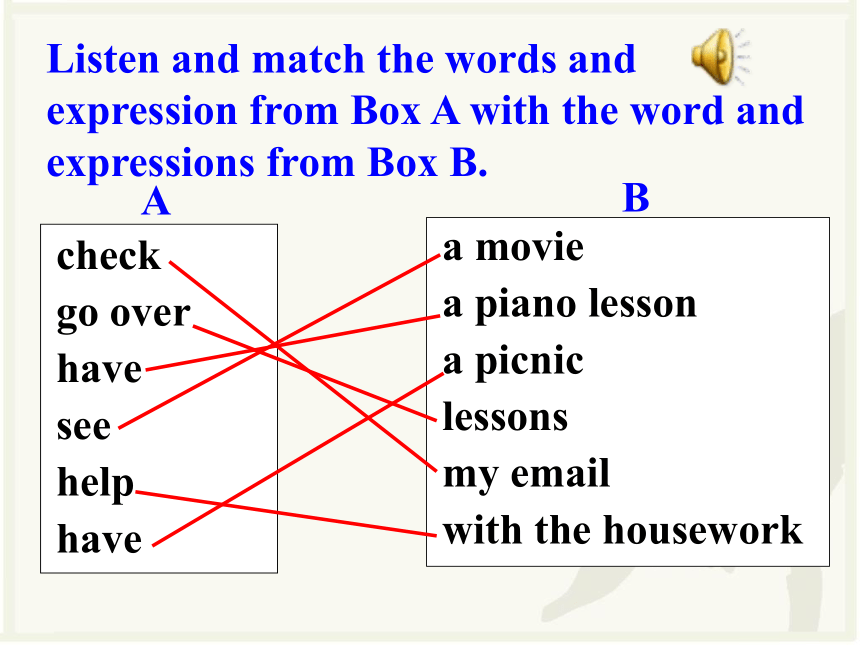
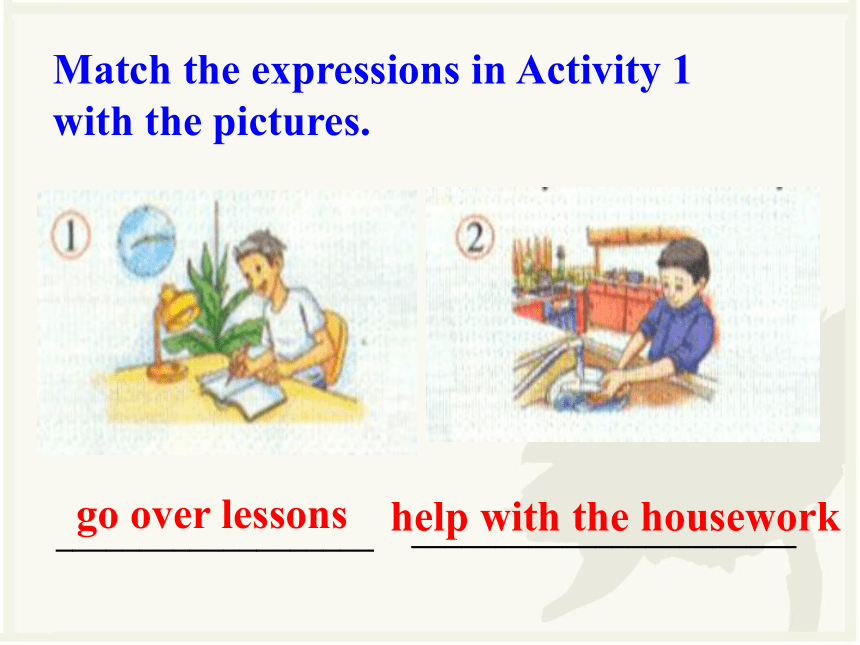
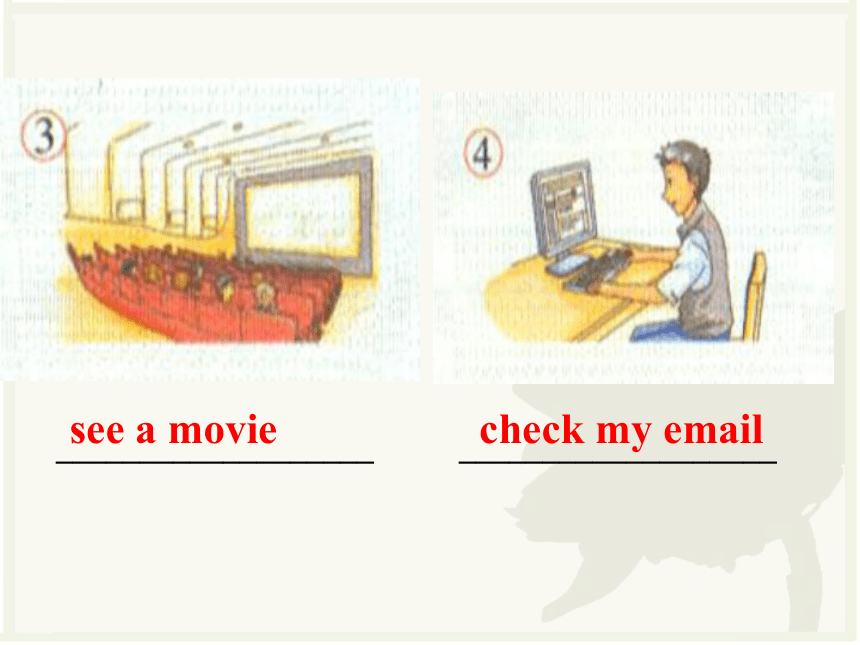
文档简介
课件45张PPT。Module 3Making plansWhat are you going to do at the weekend? Unit 1Vocabularygo over lessons 复习功课 They are going to go over lessons. do one’s homework 做家庭作业He is going to do his homework. have a piano lesson play the pianoHe is going to have a piano lesson. help with the housework 帮助做家务She is going to help with the housework. check one’s email 查某人的电子邮件 She is going to check her email. see a movie 看电影 I am going to see a movie. have a picnic 野炊 They are going to have a picnic. Listen and match the words and expression from Box A with the word and expressions from Box B. check
go over
have
see
help
have a movie
a piano lesson
a picnic
lessons
my email
with the houseworkABMatch the expressions in Activity 1 with the pictures.__________________________________________go over lessons help with the housework ______________________________________check my email see a movie ______________________________________have a piano lesson have a picnic heHe is going to go over lessonsWhat is he going to do?go over lessonshelp with the houseworksheShe is going to go over lessonsWhat is she going to do?see a movie weWhat are we going to do?We are going to see a movie.check emailBettyShe is going to check email What is Betty going to do?have a piano lessonLinglingWhat is Lingling going to do?She is going to have a piano lesson.have a picnicthey They are going to have a picnicWhat are they going to do?1. What’s Daming going to do on
Saturday morning?He is going to check his email, do his homework and help with the housework.Now answer the questions.2. What’s Betty going to do on Saturday
afternoon?
3. Who is going to have a piano lesson on
Saturday?
She is going to see a movie on Saturday afternoon.
Lingling is going to have a piano lesson on Saturday.4. Where are they going to have a picnic?They are going to have a picnic in the park.Language points1. On Saturday morning, I’m going to check my email and do my homework.周六上午我打算查看电子邮件并写作业。
I’m going to see a movie in the afternoon. 我打算下午去看电影。如果我们要表达“在上午、下午、晚上”,可以说in the morning / evening / afternoon 三个词也常跟介词in连用。例如:
Don't watch TV too much in the evening. 晚上看电视不要太多。
They sometimes play games in the afternoon. 他们有时在下午做游戏。但如果特指“在具体的某一天”或“(在具体的某一天的)上午、下午、晚上”等,须用介词on。例如:
I’ll see you on Monday morning.
周一上午见。
She always goes to see a film on Friday evening.
她总是周五晚上去看电影。中考链接:
1. —When did your uncle arrive ______ China?
—He got to Guangzhou _______the morning of the 16th of April. (2011广东广州)
A. at; in B. in; in C. to; on D. in; onD2.—When did the fire take place?
—It took place __________ Sunday morning. (2012广东湛江)
A.on B.at C.in D.ofA help v. 帮助
help with … 帮助做······
May I help with the washing-up?
我帮你洗餐具好吗?
She promised to help with the typing.
她答应帮忙打字。2. Then I’m going to help with the housework. help … with … 帮助······做······
I often help my mother with housework.
我常帮妈妈做家务。
help sb. do sth. 帮助······做······
I often help my mother do housework.3. Lingling and I going to have a picnic. have a picnic 去野餐
If it doesn't rain tomorrow, we'll have a picnic.
如果明天不下雨,我们就去野餐。
It is a good idea to have a picnic tomorrow.
明天去野餐是个好主意。
I'm going to have a picnic with my friends.
我准备和朋友去野餐。have a look at 看一看
have breakfast / lunch / supper 吃早/午/晚饭
have classes / lessons 上课
have a meeting 开会
have a rest 休息一会儿4. I’m going to stay at home alone. stay v.停留;逗留;保持
stay at home待在家里
I stayed late at the party last night.
昨晚我在晚会上呆到很晚。
You can stay at home and watch TV.
你可以待在家里并且看电视。
The temperature has stayed hot this week.
本周气温一直都很热。 stay n.停留;逗留
He went straight to New York without a stay in Hongkong.
他直接去了纽约, 没在香港停留。
He made few friends during his stay in the village.
他在这个村子逗留的期间,没有交上几个朋友。 alone adj. 一般与be动词连用,在句中作表语。表示”单独的,独立的”, 侧重于独自一人,无伙伴,无其它人在场,有点孤立无援。如:
Michael was alone in the room.
迈克独自一个人在屋里。
To tell you the truth, I don't feel like being alone tonight.
说实话, 我今晚不想孤单一人。 alone adv.意思是“单独地,独自地(与all by oneself同意)”,修饰动词时,应该放在动词后面作状语。如:
He likes living alone.
他喜欢独自地生活
They can’t finish this work alone.
他一个人不能完成这项工作。
After tea I wandered alone about the town.
吃过下午茶, 我独自在城里漫步。 alone else fantastic nothing sillyComplete the conversation with the correct form of the words from the box.4Betty: What are your plans for next weekend, Lingling?
Lingling: (1)_______. I don’t have any plans.
Betty: Are you going to spend it (2) _____ at home?
Lingling: Well, … what are you going to do?
Betty: Tony and I are going to have a picnic in the park. We’re going to have a (3)_______ time. Are you going to come?
Lingling: I’m not sure.
Betty: Don’t be (4)____! What (5)___ are you going to do? Nothing alone fantasticsilly elsePronunciation and speakingListen and repeat.Guessing GameWhat are you going to do?I’m going to have a piano lesson.What are you going to do?123456Task12 : Let’s check (Act.7)do homeworkcheck emailhave a piano lessonsee amoviego to a partylisten to some musiclisten to some musicget up earlyplay table tennisstay in bedrevise for her testgo to a partymeet Lingling and Tony
in the parkhave a picnichave a picnic--What’s Daming going to do on Saturday morning?
--He’s going to check his email and do his homework.help with the houseworkWhat are the people going to do at the weekend? Let’s guessPlay a game!What is he going to do at the weekend?He’s going to play basketball at the weekend.
What is he going to do at the weekend?He’s going to check his email at the weekend.
What is he going to do at the weekend?He’s going to swim at the weekend.
What is she going to do at the weekend?She’s going to ride a horse at the weekend.
What are they going to do at the weekend?They’re going to have a picnic at the weekend.
What are they going to do at the weekend?They’re going to watch TV at the weekend.
一般将来时:
1. 用法:be going to +动词原形表示打算做某
事,计划做某事或者有意做某事。
She is going to check her email tonight.
她打算今晚查看一下她的电子邮件。
2. 结构:be(are,am,is)+ going to + 动词原形
We are going to have a picnic on Saturday.
我们打算周六吃野餐。
3. 时间状语:tomorrow, this …, next…,
one day, tonight 以及还
没到来的时间等。The weekend is coming . We all like it . My friends and I have a lot of things to do . -----isare going to ------
Task 14: Give a report :
go over
have
see
help
have a movie
a piano lesson
a picnic
lessons
my email
with the houseworkABMatch the expressions in Activity 1 with the pictures.__________________________________________go over lessons help with the housework ______________________________________check my email see a movie ______________________________________have a piano lesson have a picnic heHe is going to go over lessonsWhat is he going to do?go over lessonshelp with the houseworksheShe is going to go over lessonsWhat is she going to do?see a movie weWhat are we going to do?We are going to see a movie.check emailBettyShe is going to check email What is Betty going to do?have a piano lessonLinglingWhat is Lingling going to do?She is going to have a piano lesson.have a picnicthey They are going to have a picnicWhat are they going to do?1. What’s Daming going to do on
Saturday morning?He is going to check his email, do his homework and help with the housework.Now answer the questions.2. What’s Betty going to do on Saturday
afternoon?
3. Who is going to have a piano lesson on
Saturday?
She is going to see a movie on Saturday afternoon.
Lingling is going to have a piano lesson on Saturday.4. Where are they going to have a picnic?They are going to have a picnic in the park.Language points1. On Saturday morning, I’m going to check my email and do my homework.周六上午我打算查看电子邮件并写作业。
I’m going to see a movie in the afternoon. 我打算下午去看电影。如果我们要表达“在上午、下午、晚上”,可以说in the morning / evening / afternoon 三个词也常跟介词in连用。例如:
Don't watch TV too much in the evening. 晚上看电视不要太多。
They sometimes play games in the afternoon. 他们有时在下午做游戏。但如果特指“在具体的某一天”或“(在具体的某一天的)上午、下午、晚上”等,须用介词on。例如:
I’ll see you on Monday morning.
周一上午见。
She always goes to see a film on Friday evening.
她总是周五晚上去看电影。中考链接:
1. —When did your uncle arrive ______ China?
—He got to Guangzhou _______the morning of the 16th of April. (2011广东广州)
A. at; in B. in; in C. to; on D. in; onD2.—When did the fire take place?
—It took place __________ Sunday morning. (2012广东湛江)
A.on B.at C.in D.ofA help v. 帮助
help with … 帮助做······
May I help with the washing-up?
我帮你洗餐具好吗?
She promised to help with the typing.
她答应帮忙打字。2. Then I’m going to help with the housework. help … with … 帮助······做······
I often help my mother with housework.
我常帮妈妈做家务。
help sb. do sth. 帮助······做······
I often help my mother do housework.3. Lingling and I going to have a picnic. have a picnic 去野餐
If it doesn't rain tomorrow, we'll have a picnic.
如果明天不下雨,我们就去野餐。
It is a good idea to have a picnic tomorrow.
明天去野餐是个好主意。
I'm going to have a picnic with my friends.
我准备和朋友去野餐。have a look at 看一看
have breakfast / lunch / supper 吃早/午/晚饭
have classes / lessons 上课
have a meeting 开会
have a rest 休息一会儿4. I’m going to stay at home alone. stay v.停留;逗留;保持
stay at home待在家里
I stayed late at the party last night.
昨晚我在晚会上呆到很晚。
You can stay at home and watch TV.
你可以待在家里并且看电视。
The temperature has stayed hot this week.
本周气温一直都很热。 stay n.停留;逗留
He went straight to New York without a stay in Hongkong.
他直接去了纽约, 没在香港停留。
He made few friends during his stay in the village.
他在这个村子逗留的期间,没有交上几个朋友。 alone adj. 一般与be动词连用,在句中作表语。表示”单独的,独立的”, 侧重于独自一人,无伙伴,无其它人在场,有点孤立无援。如:
Michael was alone in the room.
迈克独自一个人在屋里。
To tell you the truth, I don't feel like being alone tonight.
说实话, 我今晚不想孤单一人。 alone adv.意思是“单独地,独自地(与all by oneself同意)”,修饰动词时,应该放在动词后面作状语。如:
He likes living alone.
他喜欢独自地生活
They can’t finish this work alone.
他一个人不能完成这项工作。
After tea I wandered alone about the town.
吃过下午茶, 我独自在城里漫步。 alone else fantastic nothing sillyComplete the conversation with the correct form of the words from the box.4Betty: What are your plans for next weekend, Lingling?
Lingling: (1)_______. I don’t have any plans.
Betty: Are you going to spend it (2) _____ at home?
Lingling: Well, … what are you going to do?
Betty: Tony and I are going to have a picnic in the park. We’re going to have a (3)_______ time. Are you going to come?
Lingling: I’m not sure.
Betty: Don’t be (4)____! What (5)___ are you going to do? Nothing alone fantasticsilly elsePronunciation and speakingListen and repeat.Guessing GameWhat are you going to do?I’m going to have a piano lesson.What are you going to do?123456Task12 : Let’s check (Act.7)do homeworkcheck emailhave a piano lessonsee amoviego to a partylisten to some musiclisten to some musicget up earlyplay table tennisstay in bedrevise for her testgo to a partymeet Lingling and Tony
in the parkhave a picnichave a picnic--What’s Daming going to do on Saturday morning?
--He’s going to check his email and do his homework.help with the houseworkWhat are the people going to do at the weekend? Let’s guessPlay a game!What is he going to do at the weekend?He’s going to play basketball at the weekend.
What is he going to do at the weekend?He’s going to check his email at the weekend.
What is he going to do at the weekend?He’s going to swim at the weekend.
What is she going to do at the weekend?She’s going to ride a horse at the weekend.
What are they going to do at the weekend?They’re going to have a picnic at the weekend.
What are they going to do at the weekend?They’re going to watch TV at the weekend.
一般将来时:
1. 用法:be going to +动词原形表示打算做某
事,计划做某事或者有意做某事。
She is going to check her email tonight.
她打算今晚查看一下她的电子邮件。
2. 结构:be(are,am,is)+ going to + 动词原形
We are going to have a picnic on Saturday.
我们打算周六吃野餐。
3. 时间状语:tomorrow, this …, next…,
one day, tonight 以及还
没到来的时间等。The weekend is coming . We all like it . My friends and I have a lot of things to do . -----isare going to ------
Task 14: Give a report :
同课章节目录
- Module 1 Lost and found
- Unit 1 Whose bag is this?
- Unit 2 Are they yours?
- Unit 3 Language in use
- Module 2 What can you do ?
- Unit 1 I can play the piano
- Unit 2 I can run really fast
- Unit 3 Language in use
- Module 3 Making plans
- Unit 1 What are you going to do at the weekends?
- Unit 2 We're going to cheer the players.
- Unit 3 Language in use
- Module 4 Life in the future
- Unit 1 Everyone will study at home
- Unit 2 Every family will have a small plane.
- Unit 3 Language in use
- Module 5 Shopping
- Unit 1 What can I do for you?
- Unit 2 You can buy everything on the Internet
- Unit 3 Language in use
- Module 6 Around town
- Unit 1 Could you tell me how to get to the Nationa
- Unit 2 The London Eye is on your right.
- Unit 3 Language in use
- Revision module A
- Module 7 My past life
- Unit 1 I was born in a small village.
- Unit 2 I was born in Quincy.
- Unit 3 Language in use
- Module 8 Story time
- Unit 1 Once upon a time….
- Unit 2 Goldilocks hurried out of the house.
- Unit 3 Language in use
- Module 9 Life history
- Unit 1 He left school and began work at the age of
- Unit 2 He decided to be an actor.
- Unit 3 Language in use
- Module 10 A holiday journey
- Unit 1 What did you do?
- Unit 2 This morning we took a walk.
- Unit 3 Language in use
- Module 11 Body language
- Unit 1 They touch noses!
- Unit 2 Here are some ways to welcome them.
- Unit 3 Language in use
- Module 12 Western music
- Unit 1 It's so beautiful!
- Unit 2 Vienna is the centre of European classical
- Unit 3 Language in use
- Revision module B
